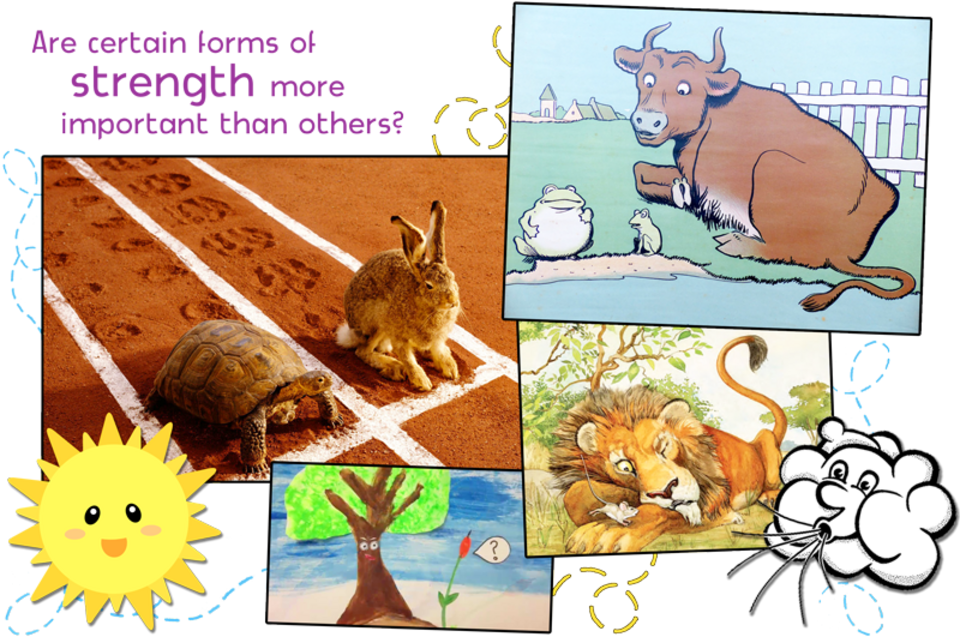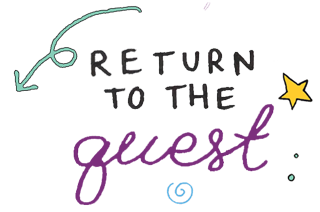
Stories of strength
| Objective: To make your views on the concept of strength shine by staging strength stories! |
Duration: 30 to 60 minutes
Material:
- Your imagination
- Sheets of paper and pencils
- Props, if needed
Instructions:
- Find your stories. Do you know the fables of Aesop or Jean de La Fontaine? In this activity, your mission will be to stage one or more stories in your own way, in order to highlight the different facets of the concept of strength. First, think about the fables or stories you know that are related to strength. There are thousands of them in all cultures! To help you get started, here is a summary of some of La Fontaine's fables (you can easily find all of them on the internet):
- The Oak and the Reed: Seeing the reed bending at the slightest breeze, the oak offers to protect it. The reed politely refuses. As the wind becomes stronger, the oak stays upright while the reed bends even lower. The wind becomes so strong that it eventually uproots the oak; the reed remains bent until the storm is over, then straightens up.
- The Turtle and the Hare: The turtle and the hare are racing each other. The hare, confident he will win, wastes his time instead of running while the turtle slowly but surely makes progress. And at the finish line, the turtle wins.
- The Sun and the Wind: The sun and the wind are competing to see who can get a person to take off their coat the fastest. The wind starts by blowing with all its might, then adds rain, snow and ice, even becomes a storm, yet nothing works—the person keeps his coat on. As soon as the sun begins to heat up, the person immediately takes off his coat.
- The Frog who wanted to be as big as the Ox: A frog admires the strength and muscles of an ox. To become as big as the ox, the frog starts to breathe in to swell and swell and swell... until it bursts!
- The Lion and the Mouse: A lion decides to spare the life of a mouse that passes by him, instead of gobbling him up. Then the lion gets caught in a net that it can't break despite all of its strength. The mouse arrives and, with its little teeth, gnaws at the mesh of the net, freeing the lion.
Choose one or more stories you want to stage!
- Change your stories. Now think about how you could change the stories you have chosen. Maybe you can add characters that represent other aspects of strength. Or keep the story as it is, but play it through other characters in another context. What if this story happened to humans... or aliens? You can also change the ending if you want to offer a different moral to your audience. What if the frog managed to get as big as the ox, what would it do next? You can even leave the ending ambiguous to encourage your audience to think about the lesson of the story for themselves!
- Set the stage. Then prepare the space you need to present your stories. Will you need a stage, set or props? Will you use costumes to show your audience what character you are playing?
- Present your stories. When everything is ready for the big show, invite your family to sit down and listen to your stories of strength.
- Think about your stories. Was it easy or difficult to represent strength through different stories? Together with the members of your audience, think about the following questions: What is strength? Are some forms of strength more important than others? Can being too strong be a problem? Why or why not?
...
Bonus: There are a lot of expressions and sayings about strength. Some are even quotes from the fables given as examples above! If you still want to fuel your brain cells with your audience members, wonder together about the following expressions:
|

| Tricks for tots: To help you transform your stories, think of a time in your life when you felt strong. How did you feel in your body? What were you doing? What were you thinking about? Now find another time when you felt weak and think about your body, your actions and your thoughts as well. How could you make your audience understand what it means to be strong? It might also help you to think about these questions: Is the opposite of being strong always being weak? Is everyone strong at something? Is it important to be strong? Why or why not? |
| Tips for teens: "Man is only a reed, the weakest in nature, but he is a thinking reed." This is a quote from the philosopher Blaise Pascal. According to him, although humans are weak and fragile compared to many things in nature, they are still superior to the rest of the universe because they are the only creatures capable of thinking and of being conscious of what is happening to them. Do you agree with this idea? Is it a strength to be endowed with consciousness—that is to say, to be aware of the experiences we have? Are we humans superior to the rest of the universe because we can think? What about other living beings? Hmm... maybe there is a distinction to be made between thinking as intelligence and thinking as consciousness... Which is most important in deciding the value of a living being? Why? |
Share your creative reflections by sending them via email.
Include photos of your projects and notes of your thoughts, as well as your first name and your age!


